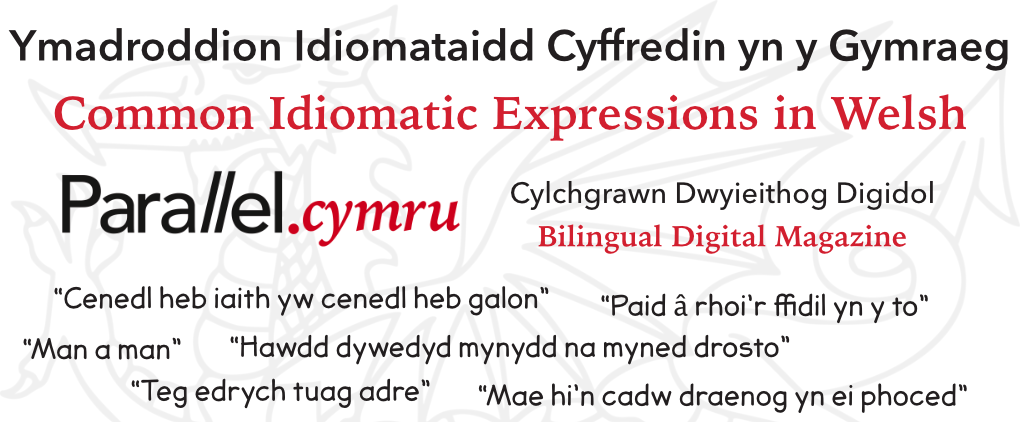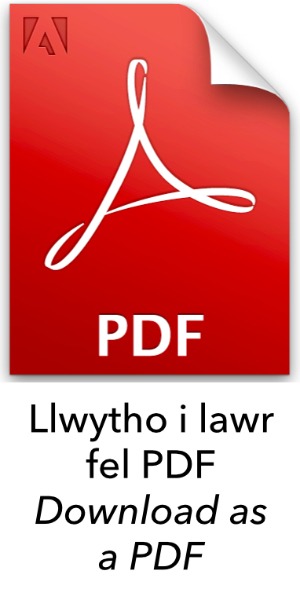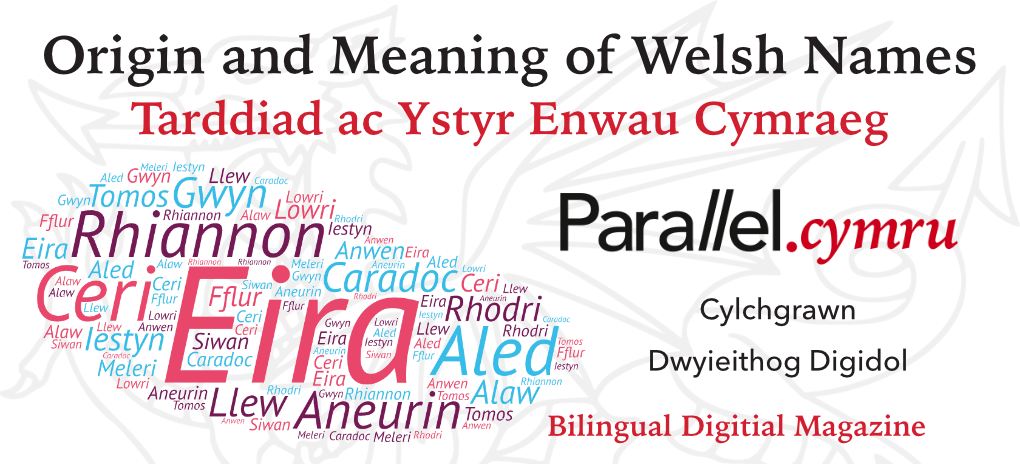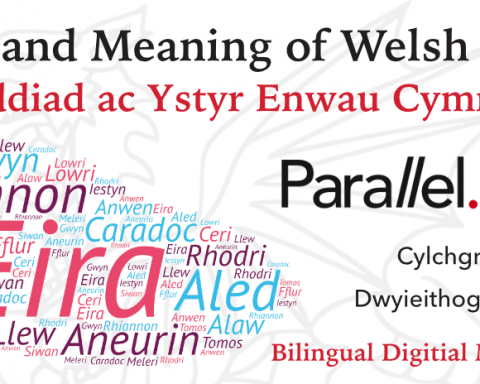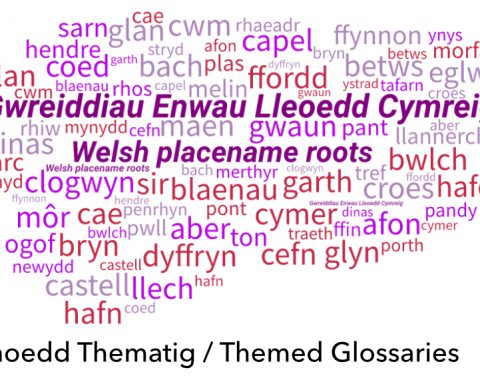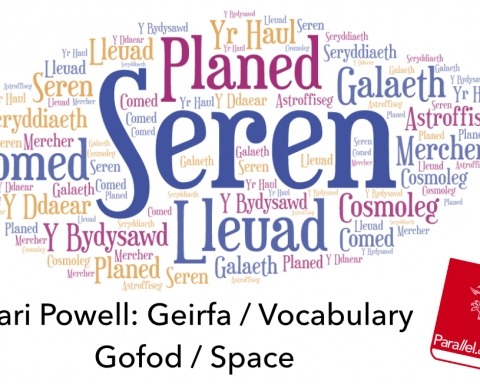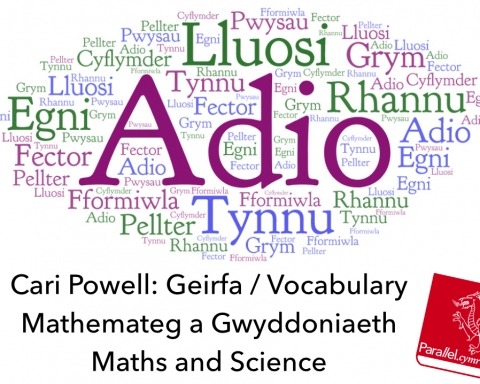Isod, mae rhestr o ymadroddion a phriod-ddulliau pob dydd yn Gymraeg. Idiomau nodweddiadol Cymraeg yw llawer ohonyn nhw ac felly ni ellir eu cyfieithu’n llythrennol o’r Gymraeg i’r Saesneg (neu i’r gwrthwyneb). Rydym wedi cynnwys enghraifft o sut i ddefnyddio pob un yn y golofn ar y dde. Mae llawer o briod-ddulliau Cymraeg yn mynegi teimlad mewn ffordd gryno e.e. 'Cenedl heb iaith (yw) cenedl heb galon'. Mae i'r rhan fwya' ohonyn nhw rythm cryf pan gân nhw'u hadrodd yn uchel e.e.'A ddwg ŵy a ddwg fwy'. Ar ben hynny, mae llawer yn creu delwedd fyw e.e. 'Mae e’n cadw draenog yn ei boced'. Gallwch ddefnyddio'r offeryn ‘Dod o hyd’ yn eich porwr i chwilio am idiom penodol yr ydych wedi'i glywed.
Yr hyn sy'n gwneud y casgliad hwn yn wahanol i gyflwyniadau eraill yw bod yr eitemau wedi'u trefnu mewn grwpiau; i ddechrau, mae rhai ymadroddion cyffredin iawn ar gyfer pobl sy’n newydd i’r iaith, ac eraill sy wedi'u trefnu yn ôl pynciau. Nodwch y bydd yn rhaid newid ambell i air (e.e. rhagenw personol), yn dibynnu ar y person neu’r bobl byddwch chi’n cyfeirio atyn nhw.
Below is a list of common expressions. Many of them are idioms, because they cannot be translated straight from Welsh to English, either word-for-word or vice versa. They are sayings that are characteristic and particular to Welsh.Many Welsh idioms express a sentiment in a concise way, such as 'Cenedl heb iaith yw cenedl heb galon' ('A nation without a language is a nation without a heart'). Most of them have a strong rhythm when they are spoken out loud, such as 'A ddwg ŵy a ddwg fwy' ('He who steals an egg will steal more'). And then again, very many create a vivid image such as 'Mae e’n cadw draenog yn ei boced' ('He keeps a hedgehog in his pocket' for 'He's tight with money').
What makes this collection different from other presentations is that the items are collated into groups; initially there are some very common expressions for those new to the language, and then others arranged by topic. We have included an example of how to use each one in the column on the right. Note that you’ll have to change some of them depending on the person or the people to whom you’re referring. You can use the Find function on your browser to look for a particular idiom that you have heard.
Collated and arranged by Patrick Jemmer, with thanks to Dafydd Roberts and David Sutton
Bord Cynnwys / Table of Contents
- Idiomataidd Cyffredin / Common Idioms
- Mwy o Idiomataidd Cyffredin / More Common Idioms
- Am Bobl / About People
- Niferoedd / Numbers
- Am Bethau / About Things
- Am Wneud Pethau / About Doing Things
- Mwy Priod-ddulliau Cymhleth a Diarhebion / More Complex Idioms and Proverbs
- Rhagor o wybodaeth / More information
Idiomataidd Cyffredin / Common Idioms
Detholiad o'r idiomau a glywir gan amlaf / A selection of the most-heard idioms.
| Ymadrodd / Phrase | Dehongliad / Interpretation | Mewn cyd-destun / In context |
| Ail law | Second-hand | Mae hi’n hoff o wisgo ‘sanau ail law She’s fond of wearing second-hand socks |
| Ar ben | Over / finished | Mae’r arholiadau ar ben erbyn hyn, diolch byth! The exams are finished now, thank goodness! |
| Ar ben ei gilydd Ar bennau ei gilydd | On top of each other / crammed in | Dyna lanast! Mae’r lluniau oll ar bennau ei gilydd What a mess! All the pictures are on top of each other |
| Ar fy mhen fy hun Ar dy ben dy hun Ar ei ben ei hun Ar ei phen ei hun Ar ein pennau ein hunain Ar eich pennau eich hunain Ar ei pennai eu hunain | On his own On your own On his own On her own On our own On your own On their own | Dw i’n casáu bod ar fy mhen fy hunan yn y tywyllwch I hate being on my own in the dark |
| Arllwys y glaw | Pouring rain | Mae hi’n arllwys y glaw heddi’ fel arfer It’s pouring with rain today as usual |
| Ar bigau'r drain | On the points of thorns / On tenterhooks / on edge | Ro’n ni ar bigau’r drain wrth ddisgwyl y canlyniadau We were on tenterhooks awaiting the results |
| Ar y blaen / Ar flaen | In front / ahead / leading | Mae tîm Cymru ar y blaen yn y gystadleuaeth hyd yn hyn The Welsh team is leading in the competition so far |
| Ar bob cyfrif | Of course / with pleasure / by all means | Ydych, dych chi’n gallu dod gyda ni ar bob cyfrif Yes, you can come with us by all means |
| Allan o wynt | Out of breath | Ar ôl dringo’r staer bydda’ i allan o wynt After climbing the stairs I’ll be out of breath |
| A’m gwynt yn fy nwrn A'th wynt yn dy ddwrn A'i wynt yn ei ddwrn A'i gwynt yn ei dwrn A'n gwynt yn ein dyrnau A'ch gwynt yn eich dyrnau A'u gwynt yn eu dyrrnau | With my wind in my fist / Out of breath | Cyrhaeddodd hi’r ysgol a’i gwynt yn ei dwrn, wedi rhedeg yr holl ffordd yno She arrived at school out of breath, having run the whole way there |
| Bob amser | All the time / always | Maen nhw’n dod yn hwyr bob amser They come late all the time / They’re always late |
| Cenedl heb iaith (yw) cenedl heb galon | A nation without a language is a nation without a heart | |
| Codi ofn ar rywun | To frighten someone | Gobeithio y bydd y bwgan brain yn codi ofn ar y adar i gyd I hope that the scarecrow will scare all the birds |
| Ar fy ngholled Ar dy golled Ar ei golled Ar ei cholled Ar ein colled Ar eich colled Ar eu colled | Worse off / losing out | Byddwn ni ar ein colled o ganlyniad i’r toriadau newydd We’ll be worse off as a result of the new cut-backs |
| Cyn bo hir | Before long / soon | Byddwn ni’n dod i ymweld â chi cyn bo hir We’ll be coming to visit you before long |
| Crynu yn ei ‘sgidiau | Shaking in one’s boots | Ro’n i’n crynu yn fy ‘sgidiau o weld y ddamwain I was shaking in my boots from seeing the accident |
| Dal ati | To keep at it | Er mwyn llwyddo, bydd yn rhaid i chi ddal ati! In order to succeed, you’ll have to keep at it! |
| Mae'n dda gan (rywun) / gyda (rhywun) | (Someone’s) glad | Mae’n dda gyda fi gwrdd â chi I’m pleased to meet you |
| Ddim hanner call | Not all there / daft | Dwyt ti ddim hanner call os byddi di’n credu hynny! You're not all there if you believe that! |
| Dro ar ôl tro | Time after time | Byddwn ni’n mynd yn ôl i’r un gwesty dro ar ôl tro We go back to the same hotel time after time |
| O ddrwg i waeth | From bad to worse | Aeth y sefyllfa o ddrwg i waeth ar ôl i chi gyrraedd! The situation went from bad to worse after you arrived! |
| Dysgu ar gof | To learn off by heart / by rote | Yn yr hen ddyddiau byddai pobl yn dysgu cerddi ar gof In the old days people would learn poems by heart |
| Dweud y drefn wrth (rywun) | To tell (someone) off | Dylet ti ddweud y drefn wrth y plant swnllyd ‘na! You should tell those noisy children off! |
| Gair am air | Word for word | Rwy’n gallu adrodd llawer o gerddi hyfryd, gair am air I can recite many lovely poems, word for word. |
| Gorau po gynta | Sooner the better | ‘Gorau po gynta yr ei di at y deintydd’ meddai Dad ‘The sooner the better you go to the dentist’ said Dad |
| I’w weld | To be seen | Doedd dim byd i’w weld yn unman There was nothing to be seen anywhere |
| Gwell hwyr na hwyrach | Better late than never | Pan gyrhaeddodd e’r cyfarfod o’r diwedd, ‘Gwell hwyr na hwyrach’ oedd unig sylw’r cadeirydd When he arrived at the meeting at last, ‘Better late than never,’ was the chairperson’s only comment |
| Gwenu o glust i glust | Smiling from ear to ear | Yn ystod y parti roedd hi’n gwenu o glust i glust During the party she was smiling from ear to ear |
| Gwneud ei orau glas | To do one’s very best | Dyn ni wastad wedi gwneud ein gorau glas yn yr arholiadau We’ve always done our very best in the exams |
| Gwneud y tro | To make do / To do the trick | Bydd y matras ‘na’n gwneud y tro nes i fi brynu gwely newydd That matress will do the trick until I buy a new bed |
| Mae’n hen bryd | It's about time / high time | Mae’n hen bryd i ni fynd ar wyliau It’s about time we went on holiday |
| Mae hi ar ben ar (rywun) | It’s all over for (someone) | Roedd hi ar ben arno fe pan gyrhaeddodd mor hwyr It was all over for him when he arrived so late |
| Mae hi wedi canu ar (rywun) | It’s all over for (someone) | Roedd hi wedi canu ar Y Gweilch yn dilyn ail gais Y Sgarlets It was all over for the Ospreys following the second try for the Scarlets |
| Mae hiraeth ar (rywun) am (rywbeth) | (Someone) is longing for / yearning for / nostalgic about (something) | Roedd hiraeth arna i am yr hen ddyddiau ysgol I was nostalgic abut the old school days |
| Man a man | Might as well | Ar ôl dydd caled o waith, man a man i ti fynd i’r dafarn Arfer a hard day of wrk, you might as well go to the pub |
| O'r golwg | Out of sight | Aeth yr arwyr ifainc o’r golwg dros y ffosydd The young heroes went out of sight over the trenches |
| Pwyso a mesur | To weigh up / consider carefully | Bydd arnoch chi angen pwyso a mesur yr holl syniadau’n ofalus You’ll need to weigh up all the ideas carefully |
| Rhag ofn | In case | Dyma i chi gwmpawd rhag ofn i chi fynd ar goll Here’s a compass in case you get lost |
| Rhoi'r gorau i | To give it up | Byddai’n well i ti roi’r gorau i ‘smygu, ‘achan! You’d better give up smoking, mate! |
| Teg edrych tuag adref | It's good to look homewards | |
| Uchel ei gloch | Loud-mouthed / loud | Jiw, Jiw, roedd y gyrrwr tacsi ‘na yn uchel ei gloch, on’d oedd e? Good grief, that taxi driver was loud-mouthed, wasn’t he? |
| Unwaith ac am byth | Once and for all | Rhaid i ni gael gwared ar y bysen saethwr unwaith ac am byth! We’ve got to get rid of the knotweed once and for all! |
| Wrth ei fodd o | Delighted / in one’s element about | Ro’ch chi wrth eich bodd o glywed y newyddion da You were delighted to hear the good news |
| Yn awr ac yn y man | Every now and then | Byddan nhw’n mynd i’r Alban yn awr ac yn y man They go to Scotland every now and then |
| Yma ac acw | Here and there | Roedd llestri brwnt wedi’u gadael yma ac acw ar y byrddau i gyd Dirty dishes had been left here and there on all the tables |
Mwy o Idiomataidd Cyffredin / More Common Idioms
| Ymadrodd / Phrase | Dehongliad / Interpretation | Mewn cyd-destun / In context |
| A barnu wrth | Judging by | A barnu wrth ei wyneb, mae hi wrth hi bodd Judging by her face, she’s delighted |
| Cael a chael | To have a close shave | Pasiais i’r arholiad, ond cael a chael oedd hi I passed the exam, but it was a close shave |
| Cael siom ar yr ochr orau | To be pleasantly surprised | Cefais i siom ar yr ochr gorau o weld y sioe I was pleasantly surprised when I saw the show |
| Cadw (o) hyd fraich | To keep at arm’s length | Mae e’n cadw ei frawd o hyd braich He keeps his brother at arm's length |
| Cilio i’r cefndir | To take a back seat | Ar ôl iddi ymddeol ciliodd hi i’r cefndir unwaith eto After she retired she took a back seat once again |
| Codi awydd arno fe Codi awydd arni hi | To make one want to do something | Roedd y gwynt hyfryd yn codi awydd arna i i flasu’r gacen The lovely smell made me want to taste the cake |
| O’r cychwyn cyntaf | From the very beginning | Rydych chi wedi bod yn anobeithiol o’r cychwyn cyntaf! You’ve been hopeless since the very beginning! |
| Fel cynffon buwch | Later than everyone else | Byddi di wastad yn cyrraedd fel cynffon buwch! You always arrive later than everyone else! |
| Dianc â chroen cyfan | To escape unscathed | Roedd e mewn damwain ond dihangodd â chroen cyfan He was in an accident but escaped unscathed |
| Fel mae’n digwydd | As it happens | Dw i ddim yn gweithio ar hyn o bryd, fel mae’n digwydd I’m not working at the moment, as it happens |
| Dod trwyddi | To see it through | Mae’r cwrs yn anodd iawn ond bydda i’n dod trwyddi The course is very hard but I’ll see it through |
| Dros ei grogi Dros ei chrogi | For the sake of his hanging / For all the world / For all the tea in China | Fyddwn i ddim yn dod gyda chi dros fy nghrogi I wouldn’t go with you for all the world |
| Dweud arno fe Dweud arni hi | To have a bad effect on one | Bydd y diffyg awyr iach yn dweud arnyn nhw The lack of fresh air will have a bad effect on them |
| Mae e’n falch o Mae hi’n falch o | He’s pleased to / She’s pleased to | Byddem ni’n falch o ddod i’r parti We would be pleased to come to the party |
| Gallu dweud ar ei lygaid Gallu dweud ar ei llygaid | To tell from one’s eyes | Ro’n i’n gallu dweud ar eu llygaid eu bod yn drist I could tell from their eyes they were sad |
| Golchi ei ddwylo â Golchi ei dwylo â | To wash one’s hands of | Dylwn i olchi fy nwylo â’r holl gynllun I should wash my hands of the whole plan |
| Lawn gymaint â | Quite as much as | Dw i ddim yn ‘smygu bellach lawn gymaint ag o’r blaen I don’t smoke now quite as much as before |
| Pwy a ŵyr | Who knows / You never know | Pwy a ŵyr, efallai y bydd hi yno You never know, perhaps she’ll be there |
| ‘Does rhyfedd ei fod e ‘Does rhyfedd ei bod hi | No wonder one is | Does rhyfedd ein bod ni’n hwyr bob amser! No wonder we’re late all the time! |
| Traed o bridd | Feet of clay | Mae hi’n ffroenuchel ond mae ganddi hi draed o bridd She’s stuck up but she has feet of clay |
| Tynnu blewyn o’i drwyn Tynnu blewyn o’i thrwyn | To take the wind out of one’s sails / To deflate | Bydd colli’r swydd yn tynnu blewyn o’i drwyn! Losing the job will take the wind out of his sails! |
| (Yn) ôl ei draed (Yn) ôl ei thraed | In one’s footsteps | Mae fy chwaer eisiau dilyn yn ôl fy nhraed My sister wants to follow in my footsteps |
| Y tu ôl i’w gefn Y tu ôl i’w chefn | Behind one’s back | Mae dy ffrind di’n hela clecs y tu ôl i’th gefn Your friend is gossiping behing your back |
| O’i wirfodd e O’i gwifodd hi | Of one’s own accord | Bydd yn rhaid i chi astudio o’ch gwirfodd You’ll have to study of your own accord |
Priod-ddulliau Mwy Cymhleth a Diarhebion / More Complex Idioms and Proverbs
Mae diarhebion yn debyg i idiomau (neu briod-ddulliau) - dywediad byrion, adnabyddus ydyn nhw, yn cyflwyno doethineb mewn ffordd gwta, gofiadwy. Isod mae rhestr o briod-ddulliau a diarhebion mwy cymhleth, yr ystyron llythrennol a sawl nodyn ar sut maen nhw’n cael eu defnyddio.
Proverbs are similar to idioms - namely short, well-known sayings, conveying wisdom in a curt, memorable way. Below is a list of more complex idioms and proverbs, the literal meanings and with some notes on how they are used.
Am Bobl / About People
| Ymadrodd / Phrase | Ystyr llythrennol / Literal meaning | Dehongliad / Interpretation |
| (Mae e’n) angel pen ffordd, diawl pen tân | (He is) an angel on the road, a devil at the fireplace | He is two-faced / He is charming to outsiders, horrid when you know them |
| Anodd tynnu cast o hen geffyl | It is difficult to cure an old horse of a bad habit | You can’t teach an old dog new tricks |
| Roedd hi’n berwi fel cawl pys | She was boiling like pea soup | She was chattering / talking incessantly |
| Mae e’n cadw draenog yn ei boced Mae hi’n cadw draenog yn ei phoced | He / she keeps a hedgehog in his pocket | He’s / she’s tight with money |
| Gellir diddanheddu’r blaidd ond ni ellir ei ddinaturio | The wolf’s teeth can be removed but his nature can’t be changed | A leopard never changes his spots |
| Ddim yn werth cnec mochyn (pumswllt) | Not worse than a sheep’s fart / Completely worthless / useless | Dyw ei frawd e ddim yn werth cnec mochyn His brother’s completely worthless |
| A ddwg ŵy a ddwg fwy | He who steals an egg will steal more | One thing leads to another |
| Mae ganddo fe ddwylo blewog Mae ganddi hi ddwylo blewog | He has ‘sticky fingers’ She has ‘sticky fingers’ | Mae gan y plant y drws nesa’ i ni ddwylo blewog, a bydd pethau’n diflannu bob tro o’r ardd! The children next door to us have sticky fingers and things are always disappearing from the garden! |
| Mae e ar gefn ei geffyl gwyn Mae hi ar gefn ei cheffyl gwyn | He / she is on the back of his / her white horse | He / she is full of mischief |
| Mae e ar gefn ei geffyl Mae hi ar gefn ei cheffyl | He / she is on the back of his / her horse | He / she is exultant / proud / on his / her high horse |
| Mae e ar gefn ei geffyl cwta Mae hi ar gefn ei cheffyl cwta | He / she is on the back of his / her short horse | He / she is in a temper |
| Mae e fel marchog ar geffyl Mae e fel marchog ar farch gwyn | He is like a knight on horseback He is like a knight on a white steed | He is like a knight in shining armour |
| Mae hi’n dawnsio ar y dibyn | She is dancing on the cliff edge | She’s playing with fire |
| Dyw’r dau dîm ddim yn yr un cae | The two teams are not on the same field/pitch | The two teams are not in the same league |
| Mae’n draed moch arnaf fi | It’s pigs’ feet on me | I’ve made a mess / in a mess |
| A ddywedo leiaf, hwnnw yw’r callaf | Who speaks the least, he is the wisest | Empty vessels make the most sound |
| Mae e’n gwybod hyd ei gyrn Mae hi’n gwybod hyd ei chyrn | He / she knows the length of his / her horns | He / she knows his own strengths and weaknesses |
| Heb ei fai, heb ei eni | He who is blameless has not been born | No-one is without fault |
| Mae e’n lladd gwair | He’s mowing hay | He’s killing time |
| Mi rown fy mhen i’w dorri (Gogledd) Fe rown fy mhen i’w dorri (De Cymru) | I’ll give my head to be broken | I’m absolutely certain |
| 'Tin du!’, meddai’r frân wrth yr wylan | 'Black arse!’, says the crow to the seagull | The pot calls the kettle black |
| A ŵyr leiaf, a ddywed fwyaf | He who knows least, says most | Empty vessels make the most sound |
Niferoedd / Numbers
| Ymadrodd / Phrase | Dehongliad / Interpretation | Mewn cyd-destun / In context |
| Ateb yn unair | To answer unanimously | Atebodd yr holl bobl yn unair gan weiddi ar y gwleidydd All the people answered unanimously, shouting at the politician |
| Mae mwy nag un ffordd i gael Wil i’w wely | There’s more than one way to get Wil to his bed / There’s more than one way to do something | Mae’n flin ‘da fi nad yw dy gynllun i ennill mwy o arian wedi llwyddo, ond, ceda di fi, mae mwy nag un ffordd i gael Wil i’w wely I’m sorry that your plan to earn more money hasn’t succeeded, but, believe you me, there’s more than one way to do it. |
| Dan un | At the same time / together | Bydd yn llawer gwell os byddan ni oll yn mynd i weld y rheolwr dan un It will be a lot better if we all go to see the manager at the same time |
| Rhedeg am y cyntaf | To run for first-place / To race | Gallwn ni redeg am y gynta’ i’r siopiau We can race to the shops |
| Fel ci â dau gynffon | Like a dog with two tails / Extremely pleased | Roedd Siôn fel ci â dau gynffon ar ôl ennill y gêm Siôn was extremely pleased after winning the game |
| Ddwywaith gymaint | Twice as much | Fydda i ddim yn llwyddo hyd yn oed os bydda i’n astudio ddwywaith gymaint â hi I won’t succeed even if I study twice as much as her |
| Dauddyblyg | Two-fold / As much again | Roedd gan fy Mam doniau dauddyblyg: fel athrawes ac fel awdur My Mother had two-fold talents: as a teacher and as an author |
| Deufisol | Bi-monthly | Bydd y cyfarfod deufisol yn digwydd unwaith bob yn ail fis The bi-monthly meeting takes place once every two months |
| Di-ail Heb ei ail Heb ei hail | Second to none | Mae’r siop newydd yn y dre’ heb ei hail The new shop in town’s second to none |
| 'Does dim dwywaith amdani | There’s no two ways about it / It’s absolutely certain | ‘Sdim dwywaith amdani, bydd yn rhaid i ni symud tŷ flwyddyn nesa’ There’s no two ways about it, we’ll have to move house next year |
| Tri chynnig i Gymro | ‘Three tries for a Welshman’ | Mae rhai’n credu y bydd Cymro neu Gymres yn llwyddo o gael tri chyfle i gyflawni tasg, a dyna pam y dywedir ‘Tri chynnig i Gymro’ Some people believe that a Welshman or Welshwoman will succeed after having three tries at completing a task, and that’s why they say ‘Three tries for a Welshman’ |
| Tri chysur henaint: tân, tê, a thybaco | The three comforts of old age: fire, tea, and baccy | Wel, falle taw tri chysur henaint yw tân, tê, a thybaco, ond dylai rhywun fod wedi rhybuddio Tad-cu cyn iddo danio’r tŷ gyda’i getyn ac wedyn trio diffodd y fflamiau gyda disgled o dê! Well, perhaps the three comforts of old age are fire, tea, and baccy, but someone should have warned Grand-pa before he set the house on fire with his pipe and then tried to put out the flames with a cup of tea! |
| Unwaith yn y pedwar amser | Once in the four times / Once in a blue moon | Dim ond unwaith yn y pedwar amser byddan nhw’n mynd i ymweld â ni It’s only once in a blue moon they come to visit us |
| Mae e ar ei bedwar Mae hi ar ei phedwar | He’s on all fours She’s on all fours | Aethon ni ar ein pedwar er mwyn mynd trwy’r twnnel We went on all fours to go through the tunnel |
| Estyn ei bump Estyn ei phump | To extend his hand To extend her hand | Peidiwch ag estyn eich pump os byddwch yn cwrdd â’r cwîn! Don’t extend your hand if you meet the queen! |
| Rhoi ei bump ar Rhoi ei phump ar | To nab / grab / pinch | Dych chi wedi rhoi’ch pump ar fy mrechdan i? Have you pinched my sandwich? |
| Yn y seithfed nef | In seventh heaven | Bydda i yn y seithfed nef pan fydda i wedi gorffen y gwaith I’ll be in seventh heaven when I’ve finished the work |
| Yr hoelion wyth | The eight nails / Pillars of the community | Un o’r hoelion wyth rownd ffor’ma yw Jones y Cigydd Jones the Butcher is one of the pillars of the community round here |
| Ar y naw | On the nine / awfully / terribly | Roedd yr arholiad yn anodd ar y naw The exam was terribly difficult |
| Saith gwaeth / Naw gwaeth | Seven times worse / Nine times worse / Much worse | Roedd ei phroblemau naw gwaeth ar ôl iddi golli ei swydd Her problems were much worse after she lost her job |
| Arddegau | Teenage years | Yr arddegau yw’r cyfnod rhwng un deg un ac un deg naw oed The teens is the period between eleven and nineteen years old |
| Siarad pymtheg i'r dwsin Siarad deunaw i'r dwsin | To talk nineteen to the dozen | Mae e wastad yn siarad pymtheg i'r dwsin He always talks nineteen to the dozen |
| Taro deuddeg | To hit the nail on the head | Mae’r adrodd gan y pennaeth wedi taro deuddeg o ran problemau’r ysgol The report by the headteacher has hit the nail on the head with respect to the school's problems |
| Hanner cant namyn un | Forty-nine | Un llai na phum deg yw hanner cant namyn un Forty-nine is one less than fifty |
| Rhif y gwlith | Numbered like the dew-drops / Innumerable | Cafodd milwyr rif y gwlith eu lladd ym Mrwydr y Somme Innumerable soldiers were killed in the Battle of the Somme |
Am Bethau / About Things
| Ymadrodd / Phrase | Ystyr llythrennol / Literal meaning | Dehongliad / Interpretation |
| Allwedd arian a egyr pob clo | Money is the key that opens all locks | Money’s the answer to everything |
| Bwlch yr aiff ceffyl a throl drwyddo yw hwn | This is a gap a horse and cart will go through | This is a huge gaping hole |
| Y mae dau du i bob tudalen | There are two sides to every page | There’s two sides to every story |
| A elo yn hwch i Rydychen, yn hwch y daw yn ôl | A sow that goes to Oxford will still be a sow when she returns | You can’t make a silk purse out of a sow’s ear |
| Mae’r esgid yn gwasgu | The shoe is squeezing | Money is tight |
| Gŵr dieithr yw yfory | Tomorrow is a stranger | Tomorrow’s another day |
| Dyna’r drwg yn y caws | That’s the badness in the cheese | That’s the fly in the ointment |
| Gwell fy mwthyn fy hun na phlas arall | Better my own cottage than the palace of another | There’s no place like home |
| Aeth y newydd ar gyrn a phibau | There news spreads on horns and pipes | There news spread like wildfire |
| Segurdod yw clod y cledd | A sword’s credit is its idleness | Power is best when it’s not used |
Am Wneud Pethau / About Doing Things
| Ymadrodd / Phrase | Ystyr llythrennol / Literal meaning | Dehongliad / Interpretation |
| Cam dros y trothwy, hanner y daith | A step over the threshold is half the journey | Every journey begins with a single step |
| Can di bennill mwyn i’th nain, fe gân dy nain i tithau | Sing your grandma a sweet song and your gran shall sing for you | I’ll scratch your back if you scratch mine |
| Canu cyn borefwyd, crïo cyn swper | To sing before breakfast is to weep before supper | Don’t count your chickens before they’re hatched |
| Paid â chodi pais ar ôl piso (informal) Peidiwch â chodi pais ar ôl piso (formal) | Don’t raise your petticoat after peeing | Don’t cry over spilt milk |
| Y cyntaf i’r felin caiff falu | The first to the mill will get to grind | First come, first served / The early bird catches the worm |
| Deuparth gwaith ei ddechrau | Two-thirds of a job is starting it | Once begun a job’s soon done |
| Ennyn cannwyll i chwilio am haul canoldydd | To light a candle to search for the mid-day sun | To go on a fools’ errand |
| Gwna dda dros ddrwg, uffern ni’th ddwg | Repay evil with good, and hell will not claim you | |
| Roedd e’n cerdded yn ling-di-long | He was loitering / walking casually | He was dilly-dallying / shilly-shallying |
| Dianc rhag y mwg a syrthio i’r tân | To escape from the smoke and fall into the fire | To jump from the frying-pan into the fire |
| Dyfal donc a dyr y garreg | Constant tapping breaks the stone | Slow and steady wins the day |
| Dw i eisiau rhoi’r ffidil yn y to | I want to put the fiddle in the roof | I want to throw in the towel / give up |
| Gorau cam, cam cyntaf | The best step, the first step | Every journey begins with a single step |
| Gorau prinder, prinder geiriau | The best economy, economy of words | Least said soonest mended |
| Gochel y pechod cyntaf, canys y mae lleng yn dynn wrth ei sawdl | Beware of the first sin, for there is a legion hard on its heels | Bad leads to worse |
| Hawdd dywedyd ‘mynydd’ na myned drosto | It is easier to say ‘mountain’ than to go over it | It’s easier said than done |
| Hawdd dweud na ‘neud | It’s easier said than done | |
| Hir y byddir yn cnoi tamaid chwerw | A bitter morsel will be chewed for a long time | Sin in haste, repent at leisure |
| Pan fo llawer yn llywio fe sudda’r llong | When the steersmen are many the ship will sink | Too many cooks spoil the broth |
| Prynu cath mewn cwd | To buy a cat in a bag | To buy a pig in a poke |
| Mae rhywbeth ar y gweill | There’s something on the (knitting) needles | There’s something in progress / ‘up’ |
| Na sang ar droed ci chwerw | Do not trample on an angry dog’s paw | Let sleeping dogs lie |
| Troi’r gath yn y badell | To turn the cat in the pan | To change the subject |
Mwy Priod-ddulliau Cymhleth a Diarhebion / More Complex Idioms and Proverbs
| Ymadrodd / Phrase | Ystyr llythrennol / Literal meaning | Dehongliad / Interpretation |
| Adar o'r unlliw (a) hedant i'r unlle | Birds of the same colour fly to the same place | Birds of a feather flock together |
| Adfyd a ddaw â dysg yn ei law | Sweet are the uses of adversity | Adversity brings learning in its hand |
| Adfyd ddwg wybodaeth, gwybodaeth ddoethineb | Adversity bears knowledge, and knowledge wisdom | Hardship is a good teacher |
| Araf deg mae mynd ymhell / Yn ara’ deg mae dal iâr | By going slowly one goes far | Slow and steady wins the race |
| Nid aur (yw) popeth melyn | Everything yellow is not gold | All that glitters is not gold |
| Benthyg dros dro popeth yn y byd hwn | Nothing’s permanent | A temporary borrowing is everything in this world |
| Mwyaf y brys, mwyaf y rhwystr | The greater the hurry, the greater the hindrance | More haste less speed |
| Cartref yw cartref er tloted y bo | There’s no place like home | |
| Ceffyl da yw ewyllys | Determination is a good horse | |
| O geiniog i geiniog yr â’r arian yn bunt | From penny to penny the money becomes a pound | Look after the pennies and the pounds look after themselves |
| Mae chwarae’n troi’n chwerw wrth chwarae gyda thân | Playing turns bitter when you play with fire | Play with fire and you’ll get burned |
| Chwery mab noeth, ni chwery mab newynog | A naked boy will play, but a starving boy will not play | |
| Ci yn udo noson ole, newydd ddrwg ddaw yn y bore | A baying dog on a moonlit night, bad news comes in the morning | A portent of doom |
| Wrth gicio a brathu mae cariad yn magu | Kicking and biting, love grows up | |
| Cynt cwymp dâr na miaren | Sooner an oak falls than a briar | Home is home despite how poor it may be |
| Mae dafan ddu ym mhob praidd | There is a bad sheep in evey flock | There’s a bad apple in evey barrel |
| Derfydd dannedd merch yn gynt na’i thafod | A girl’s teeth wear out sooner than her tongue | |
| Diwedd y gân yw’r geiniog | The end of the song is the penny | To sing for your supper |
| Dywed yn dda am dy gyfaill, am dy gelyn dywed ddim | Speak well of your friend and about your enemy say nothing | |
| Mae’r euog yn ffoi heb neb yn ei erlid | The guilty flee when no one chases him | The guilty flee their own shadows |
| Gall pechod mawr ddyfod trwy ddrws bychan | A big sin can come in through a tiny door | One thing leads to another / It’s a slippery slope |
| Gormod o bwdin a dagith gi | Too much pudding chokes a dog | To have too much of a good thing |
| Gwell bachgen call nab renin ffôl | Better a wise boy than a foolish king | |
| Gwyn y gwêl y frân ei chyw | The crow sees her chick as white | To have a biased opinion of someone |
| Gŵr heb bwyll, llong heb angor | A man without sense is a ship without an anchor | |
| Yr hen a ŵyr a’r / yr ifanc a dybia | The old know and the young suspect | Respect the wisdom of your elders |
| Llon llygod lle ni bo cath | Merry mice where there's no cat | When the cat's away, the mice play |
| Yr oen yn dysgu’r ddafad i bori | The lamb teaches the ewe to graze | |
| Mewn pob daioni mae gwobr | In every goodness there’s a prize | Goodness is its own reward |
| Rhaid cropian cyn cerdded | One must crawl before walking | Learn to walk before you can run |
| Taro’r post i’r pared gael clywed | To hit the post so that the wall hears |
Am ragor o wybodaeth, gweler / For more information, see:
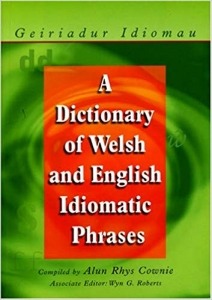
A R Cownie (2001) Geiriadur Idiomau (A Dictionary of Welsh and English Idiomatic Phrases). Cardiff UK: University of Wales Press

T Jones ac B Fitzgerald (1996) A Little Book of Welsh Proverbs (Welsh and English). Belfast UK: Appletree Press
Diarhebion Hynafol / Ancient Proverbs
Ceir y diarhebion hynafol, canlynol ar y blog diddorol iawn o'r enw Sedulia's Quotations lle mae'r awdur wedi'u casglu nhw o sawl hen ffynhonnell. Yma, rydym ni wedi diweddaru'r sillafu ychydig, trwy, er enghraifft, droi 'fyno' yn 'fynno', heb newid ystyr yr ymadrodd. Rydym hefyd wedi darparu cyfieithiadau sydd ychydig mwy llythrennol i lawer o'r diarhebion, a rhoi ystyron lle roedd angen.
Mae'n ymddangos bod 'arwyddeiriau' hen deuluoedd yw llawr o'r rhain, ac felly ni fydd pobl yn eu defnyddio ym mywyd pob dydd heddi' fel rheol. Rydym yn eu rhannu nhw yma i ddangos sut y defnyddir iaith eitha' hynafol yn cynnwys ffurfiau ffurfiol a llenyddol iawn - ni fydd yn rhaid i ddysgwyr eu dysgu na'u defnyddio ar lafar!
The following ancient proverbs are found on the very interesting blog called Sedulia's Quotations where the author has collected them from several old sources. Here, we have updated the spelling a little, by, for example, turning 'fyno' into 'fynno', without changing the meaning of the phrase. We have also provided translations which as a little more literal for many of the proverbs, and given meanings where needed.
It appears that many of these are the 'mottoes' of old families, and so people don't use them in everyday life today as a rule. We are sharing them here to show how quite archaic language, containing very formal and literary forms, is used - there's no need for learners to learn or use them in speech.
| A ddarleno ystyried | Let him who reads reflect |
| A ddialo air hagr rhoed ateb teg | He who would revenge a harsh word let him give a gentle reply |
| A ddwg angau nid adfer | What death takes it will not restore |
| A ddywedo pob un gwir yw | What everyone says is true |
| A elwir yn gall a gais fod yn gall | He who is called wise will seek to be wise |
| A fo gâr iddo ei hun a gaiff pob un arall yn gâr iddo | He who is his own friend will have everyone else as his friend |
| A fo ysgafn galon ef a gân | The light-hearted will sing |
| A fynno barhau yn hir yn ieuanc aed yn ebrwydd yn hen | He who wishes to stay young for a long time let him soon become old |
| A fynno barch bid gadarn | He who desires respect let him be strong |
| A fynno Duw derfid | What God wills let it be done |
| A fynno ei fodd porthed amynedd | Who desires to be satisfied let him feed patience |
| A fynno wrando bid gymar | He who would listens let him be a companion |
| A fynno iechyd bid lawen | He who desires health let him be cheerful |
| A gano yn ei wely, a gria cyn cysgu | He who sings in his bed shall cry before sleeping He who wishes his neighbour ill, shall come to ill himself |
| A gerir neu caseir a welir o bell | He who is loved or hated is seen from afar |
| A ystyrio gwnaed | He who considers: let him act |
| Mae adfail dedwydd yn ddiddos | A joyful ruin is snug |
| Adfyd a bair i rai edrych o'u deutu | Adversity causes some to look around them |
| Adfyd a ddaw â dysg yn ei law | Adversity brings instruction in its hand |
| Adfyd a phall a wna ddyn yn gall | Adversity and failure make a man wise |
| Addawa y môr a'r mynydd | He promises the sea and the mountain |
| Addef yw tewi | To be silent is to confess |
| Ail natur yw greddf arferiad | Practised instinct is second nature |
| Allan o olwg allan o feddwl | Out of sight out of mind |
| Am y tywydd gorau tewi | It is best to be silent about the weather |
| Aml fai lle nis cerir | Many are the faults where there is no-one loving |
| Amlwg cas a chariad | Hatred and love are conspicuous |
| Amod a dyr ddefod | An agreement will break a custom |
| Anaml lles o rodio'r nos | Seldom is there benefit in wandering at night |
| Angen a dyr ddeddf | Need will break a law |
| Angwanegiad mefl mawrair | Augmentation is the shame of boasting |
| Ar ddiwedd y mae barnu | At the end there is judging |
| A'r ni roddo na charu ni chaiff a ddymuno | He who neither gives nor loves shall not have what he desires |
| Arf glew yn ei galon | The weapon of the brave is in his heart |
| Arglwydd gwan, gwae ei was | Woe to the servant of a feeble lord |
| Asgre lân, diogel ei pherchen | Safe is the owner of a pure heart |
| Ateb araf gan ddysgedig | A slow answer from a wise man |
| Blwyddyn o eira, blwyddyn o lawndra | Year of snow, year of plenty |
| Bo tynnaf y llinyn cyntaf y tyr | The tighter the string the sooner it will break |
| Bum gall unwaith, hynny oedd llefain pan y’m ganed | I was wise once, that was crying when I was born |
| Byr ei hun, hir ei hoedl | Short his sleep, long his life |
| Doeth pawb tra tawant | All are wise while they are silent |
| Hir nych yr angau | Long is the languor of death |
| Ni chaiff chwedl nid êl o’i dŷ | He gets no news who goes not from his house |
| Ni ŵyr neb lai na’r hwn a ŵyr y cyfan | No one knows less than he who knows all |
| Nid hawdd gwybod y cyfan | It is not easy to know everything |
| Pob hir nychdod hir angau | Every long pining is a long death |
| Plant gwirionedd yw hen ddiarhebion | Old proverbs are the children of truth |
| Rhydd barn i bawb | Opinion is free to all |
| Y doeth ni ddywed a ŵyr | The wise man does not say what he knows |

